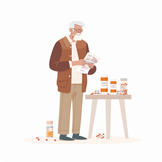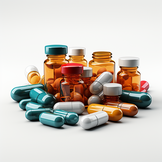Can statins improve erectile dysfunction?
- Understanding Erectile Dysfunction (ED)
- The Role of Lifestyle Factors in ED: Stress, Smoking, and Alcohol
- LDL-C and Its Association with Endothelial Function
- Analysis of Research Studies on Statins and ED
- The Effect of Statins on Nitric Oxide Availability
- Understanding Statins: Their Purpose and Mechanism
- The Importance of Lifestyle Modifications for Cardiovascular Health and Improvement of Erectile Function
- Statins and Atherosclerosis-Related Heart Disease
- The Connection Between Statins and Improved Blood Flow to the Penis
- Comparison of Statins and Other Drugs (Viagra, Cialis, Levitra) in Improving Erectile Function
- Caveats: Statins as a Treatment for ED, Not a Cure
- Addressing Related Questions

Understanding Erectile Dysfunction (ED)
Erectile Dysfunction (ED) is a common condition that affects men, characterized by the inability to achieve or maintain an erection sufficient for sexual activity. ED can significantly impact a person's quality of life, leading to stress, low self-esteem, and relationship issues. Multiple factors, including physical conditions like diabetes, psychological factors like stress, and lifestyle habits like smoking and alcohol use, can contribute to ED.
The Role of Lifestyle Factors in ED: Stress, Smoking, and Alcohol
Lifestyle factors play a crucial role in the development of ED. High-stress levels can disrupt the body's hormonal balance, which can hamper erectile function. Similarly, smoking and alcohol can damage blood vessels, impairing vascular blood flow necessary for achieving an erection.
LDL-C and Its Association with Endothelial Function
Low-Density Lipoprotein Cholesterol (LDL-C), often referred to as 'bad cholesterol,' contributes to atherosclerosis, a condition characterized by the hardening and narrowing of the arteries. This compromises endothelial function - the health and performance of the endothelial cells lining the blood vessels. Reduced endothelial function can impair blood flow, including to the penis, contributing to ED.
Analysis of Research Studies on Statins and ED
A number of studies published in the Journal of Sexual Medicine have explored the potential link between statins, LDL-C lowering drugs, and improved erectile function. These studies indicate that men with high cholesterol levels who were administered statins demonstrated improved erectile function scores, suggesting a positive correlation.
The Effect of Statins on Nitric Oxide Availability
Statins are known for their cholesterol-lowering effects, but they also exert pleiotropic effects – biological actions unrelated to their cholesterol-lowering properties. One such effect involves increasing the availability of nitric oxide, a molecule essential for initiating and maintaining an erection. This happens because nitric oxide relaxes the muscles in the penis, enhancing blood flow.
Understanding Statins: Their Purpose and Mechanism
Statins are primarily used to manage high cholesterol levels.
They work by inhibiting the enzyme HMG-CoA reductase, which plays a vital role in the liver's production of cholesterol.As a result, the liver pulls more LDL-C from the bloodstream, helping to reduce the overall cholesterol levels in the body.
The Importance of Lifestyle Modifications for Cardiovascular Health and Improvement of Erectile Function
Beyond pharmaceutical interventions, lifestyle modifications are key to both cardiovascular health and the improvement of erectile function. This includes maintaining a balanced diet, regular exercise, and the reduction or cessation of smoking and alcohol consumption.
Statins and Atherosclerosis-Related Heart Disease
High cholesterol levels can lead to atherosclerosis-related heart disease, a leading cause of death worldwide. Statins, by lowering LDL-C levels, help reduce the risk of heart disease, improving both heart and endothelial function. The latter might play a crucial role in improving ED.
The Connection Between Statins and Improved Blood Flow to the Penis
Statins' impact on endothelial function could indirectly contribute to improved blood flow to the penis, potentially enhancing erectile function. As statins enhance endothelial function and promote the availability of nitric oxide, they could enable better vasodilation of the penile arteries, improving erectile function.
Comparison of Statins and Other Drugs (Viagra, Cialis, Levitra) in Improving Erectile Function
While Viagra, Cialis, and Levitra directly facilitate erections by enhancing the effects of nitric oxide, statins seem to provide a more indirect benefit. These medications work to rectify the physiological abnormalities that can cause ED, like poor endothelial function and low nitric oxide availability. This dual action - improving heart health and potentially enhancing erectile function - makes statins a noteworthy area of research.
Caveats: Statins as a Treatment for ED, Not a Cure
While the research is promising, it's crucial to remember that statins aren't a cure for ED. They may help manage some of the physiological factors contributing to ED, but they don't directly address many of the psychological or underlying health issues that can cause this condition.
Addressing Related Questions
- There can be side effects of using statins for ED, including muscle pain, liver damage, and increased blood sugar levels, among others.
- Statins may help with ED by improving endothelial function and increasing nitric oxide availability.
- The recommended dosage of statins for treating ED should be determined by a healthcare professional, considering the patient's overall health and concurrent medications.
- Statins can be taken with Viagra, but only under the guidance of a healthcare professional.
- Lowering cholesterol can potentially reverse ED by improving endothelial function and promoting better blood flow.
- The best statin for ED would depend on the individual's health profile and should be determined by a healthcare professional.
The burgeoning body of research suggests that statins could be a potential treatment option for improving ED. This link not only highlights the interconnection between cardiovascular health and sexual function but also underscores the importance of managing lifestyle factors and chronic conditions that can affect both these aspects of health. Further research is needed to fully understand and optimize the potential of statins in treating ED.



